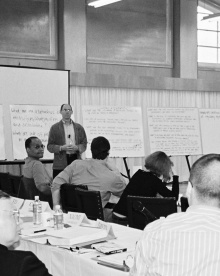Tobin Project Model
The Tobin Project has developed a powerful model for catalyzing transformative research in the social sciences. Through years of continuous innovation, Tobin has refined its program structure to effectively motivate scholarly inquiries with great potential to benefit society. The model, outlined below, has been lauded as one of the most successful mechanisms developed to-date for mobilizing publicly minded, interdisciplinary research and productively connecting scholars and their work with the policy community.
The model
- Define strategic research questions with the greatest potential to benefit society.
- Engage leading scholars across disciplines and institutions, and build communities of scholars around core research questions.
- Incubate and produce new research through scholarly collaboration and with policymaker input.
- Disseminate compelling ideas through academia, public discourse, and policy formation.
- Innovate continually on the Tobin model of strategic research development.
While these phases sometimes occur in sequence, the structure of the model is not necessarily linear and steps often overlap and reinforce one another. Key to the model’s success is the continuous engagement of scholars and policymakers within and across the Tobin Project communities. Perhaps most importantly, the Tobin Project is always innovating on its model, refining its approach as promising new lines of inquiry emerge, ideas develop, and new people become involved.
The Tobin Project’s unique place in the idea-generation pipeline
With its one-of-a-kind model and mission, the Tobin Project is uniquely positioned among the organizations working to generate and disseminate new ideas in the public arena.
Within the academy, the Tobin Project works with scholars to motivate the type of interdisciplinary work on society’s most pressing problems that is not always facilitated by typical university incentives. Through this work, Tobin often collaborates with traditional academic centers with shared research interests. These partnerships benefit from the institutional roots, resources, and experience of academic centers, while at the same time taking advantage of the Tobin Project’s entrepreneurial energy and unique role as an external catalyst with a multi-university network of scholars and policymakers.
The Tobin Project also works with government officials and other research organizations to ensure that our efforts are informed by the latest policy thinking and that key decision makers can engage with new research. Such collaboration serves to complement efforts on both sides. With a clearer understanding of current policy challenges, researchers are better able to direct their efforts toward projects that are likely to have strategic value to practitioners and greater political uptake. Policymakers and other decision makers, informed by rigorous research from scholars, can design and advocate for more effective, nuanced policy and legislation.
Across its research initiatives, Tobin works to bring scholars and policymakers together to encourage this kind of exchange. In December 2017, for instance, Tobin partnered with the Radcliffe Institute for Advanced Study at Harvard University to convene scholars, policymakers, and practitioners for a meeting on detecting and preventing special interest capture of financial regulation. To open the meeting, the U.S. Government Accountability Office presented a new report on the capture of financial regulatory bodies that was influenced by Tobin’s 2013 volume, Preventing Regulatory Capture. Their presentation served as a valuable starting point for a discussion with scholars and practitioners on how further research could advance understanding of this important issue and aid the work of the GAO. The Tobin Project works to foster this kind of meaningful interaction between scholars and policymakers across all our initiatives.


